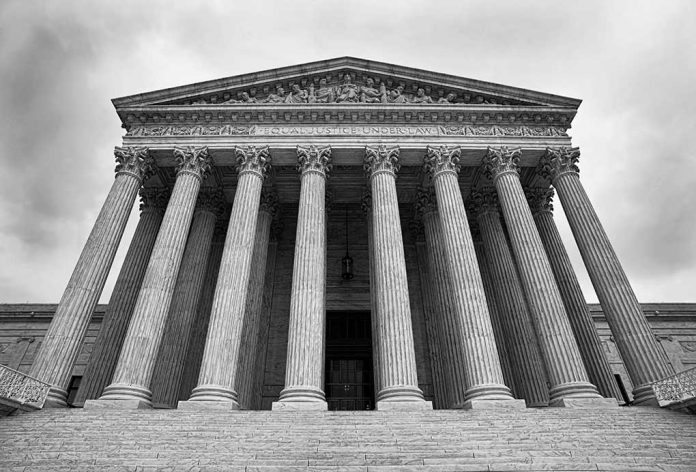
The Supreme Court unanimously strengthens the government’s authority to revoke visas for fraudulent marriages, limiting federal court intervention.
At a Glance
- Supreme Court rules 9-0 that federal courts cannot review visa revocation decisions
- Justice Ketanji Brown Jackson authored the unanimous opinion
- Ruling stems from case involving a Palestinian man’s visa revoked due to prior fraudulent marriage
- Decision emphasizes DHS’s broad discretion in visa revocation matters
- Petitioner can reapply for visa but faces challenges in overturning fraud allegations
Supreme Court Upholds Government’s Discretion in Visa Revocations
In a landmark decision, the U.S. Supreme Court has unanimously ruled that federal courts lack the authority to review the government’s decisions to revoke immigration visas. The case, Bouarfa v. Mayorkas, centered on the Department of Homeland Security’s (DHS) power to cancel visas based on allegations of fraudulent marriages. This ruling significantly bolsters the government’s ability to combat immigration fraud while limiting judicial oversight in such matters.
The case arose when Amina Bouarfa, a U.S. citizen, filed an immigration petition for her husband, Ala’a Hamayel, a Palestinian national. Although initially approved, the U.S. Citizenship and Immigration Services (USCIS) later revoked the visa upon discovering evidence of a previous marriage by Hamayel, allegedly entered into solely for immigration benefits. This revocation set off a series of legal challenges that ultimately reached the nation’s highest court.
Unanimous Decision Emphasizes DHS Discretion
Justice Ketanji Brown Jackson, writing for the court, emphasized the broad discretionary powers granted to the DHS in visa matters. The ruling underscored that visa revocations are discretionary agency decisions not subject to judicial review, effectively closing the door on federal court interventions in such cases.
“The U.S. Supreme Court on Tuesday held that revocations of previously approved visa petitions cannot be appealed in federal courts because they are discretionary agency decisions that are not subject to judicial review.”
This decision aligns with the government’s efforts to maintain integrity in the immigration system and prevent fraudulent marriages from being used as a means to obtain visas. It reinforces the authority of DHS to make determinations based on evidence of fraud without the prospect of lengthy court battles challenging those decisions.
Impact on Immigration Processes and Future Cases
The Supreme Court’s ruling has significant implications for immigration processes and future cases involving visa revocations. It establishes a clear precedent that the government’s decisions in these matters are largely final, barring extraordinary circumstances.
“May, at any time, for what he deems to be good and sufficient cause, revoke the approval of any [visa] petition.”
While the court’s decision limits judicial review of visa revocations, Justice Jackson noted that individuals like Bouarfa still have options. They can file new petitions and seek judicial review if those petitions are denied. However, this process may prove challenging, particularly in cases where fraud has been alleged.
Conclusion: Strengthening Immigration Enforcement
The Supreme Court’s ruling in Bouarfa v. Mayorkas represents a significant victory for the government in its efforts to combat immigration fraud. By affirming the DHS’s broad discretion in visa revocation matters and limiting judicial review, the decision provides a powerful tool for immigration enforcement.
As the implications of this ruling unfold, it is clear that individuals seeking immigration benefits through marriage will face increased scrutiny. The decision underscores the importance of ensuring that all immigration applications are genuine and free from any hint of fraud, as the consequences of discovered deception have become even more severe with limited recourse for appeal.
Sources
1. Supreme Court Rules 9–0 Federal Judges Cannot Second-Guess Visa Revocations
2. High Court Bars Judicial Review Of Revoked Visa Petitions














